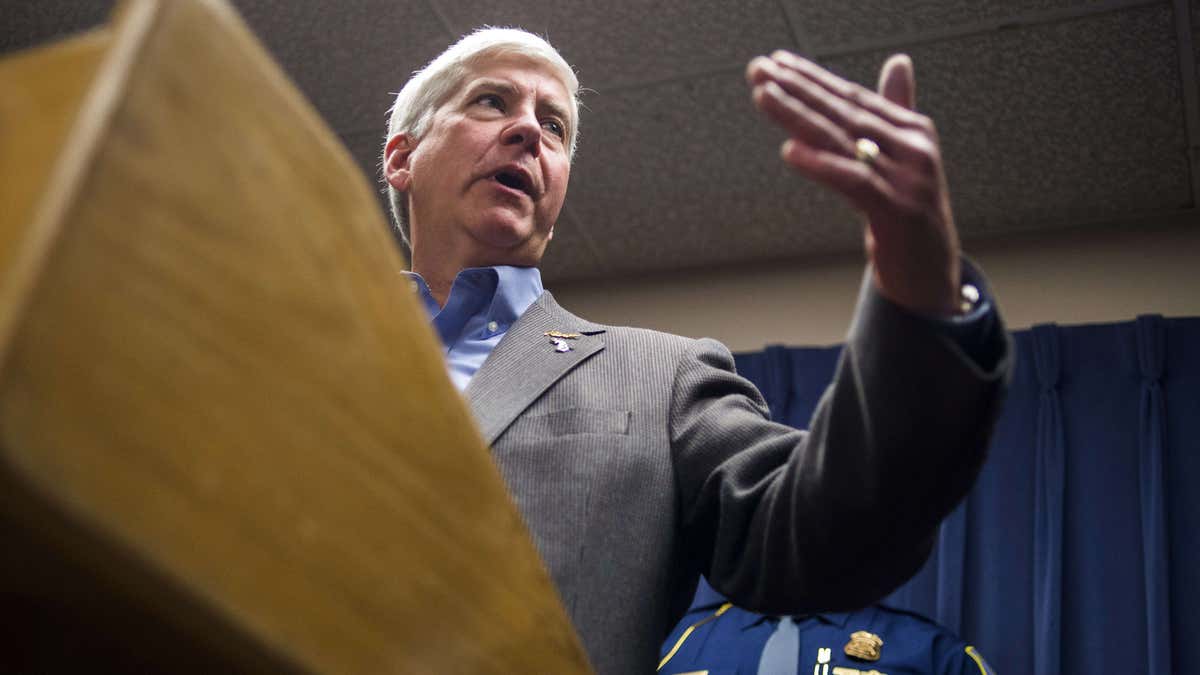
Jan. 27, 2016: Gov. Rick Snyder speaks about the Flint water crisis during a press conference on at City Hall in downtown, Flint, Mich. (Jake May /The Flint Journal-MLive.com via AP)
Michigan Gov. Rick Snyder said Wednesday the full replacement of the Flint’s lead pipes is not imminent despite the ongoing crisis of city’s lead-poisoned tap water.
Environmental and civil rights groups filed a lawsuit earlier in the day demanding the prompt replacement of all lead pipes in Flint’s water system at no cost to customers. Snyder didn’t rule at eventually replacing the lead service lines leading from water mains, but said it’s a longer-term consideration.
Virginia Tech professor Marc Edwards, who originally helped expose the lead in Flint’s water, was hired to oversee water testing. Edwards’ discovery was initially met with skepticism from state regulators leading to prolonged efforts to get the crisis under control.
"There absolutely is a trust issue," Snyder said during a news conference with state and local officials who announced more plans to address the city's crisis. The Legislature is expected to direct $28 million in additional funding toward Flint on Thursday.
Mayor Karen Weaver said residents should not have to pay for the water "they did not and are not using." Emergency budget legislation approved Wednesday by a Senate committee includes $3 million to help Flint with unpaid water bills.
"I was glad that the governor said these are just first steps because I'm asking for a staircase," she said.
Flint residents are unable to drink unfiltered tape water and tests have shown high lead leavels in some children’s blood. While under state financial management, the city switched its water source to the Flint River but without controlling corrosion. That caused lead to leech into the water for a year and a half and contributed to the spike in child lead exposure before state and officials fully acknowledged the problem in early October.
It remains unclear how badly the lead service lines were damaged by the river water. While Snyder's administration has estimated it could cost up to $55 million to repair some 15,000 pipes, he cautioned that more study is needed.
"A lot of work is being done to even understand where the lead services lines fully are," Snyder said. "The short-term issue is about recoating the pipes (with chemicals) and that will be based on third-party experts saying the water is safe. ... It's a lot of work to take out pipes, to redo all the infrastructure."
The groups’ lawsuit expresses doubt about whether the city can handle optimal corrosion treatment when it switches to another new water source later this year. The suit is seeking a ruling to force state officials to fix alleged violations of the U.S. Safe Drinking Water Act, including failure to properly treat the water for corrosion, test it for lead and notify residents of results and accurately report if the correct sample sites are being selected.
"It's essentially asking the government to do its job," said Wayne State University assistant law professor Noah Hall. "There doesn't seem to be any unit or level of government that didn't screw up here."
The suit was filed by the Natural Resources Defense Council on behalf of citizens, along with the American Civil Liberties Union of Michigan, the Concerned Pastors for Social Action and Melissa Mays, a Flint resident.
At least three other suits have been filed since the crisis was exposed in the fall. Two seek class-action status and financial compensation; another asks a judge to declare that users do not have to pay their water bills.
Snyder also announced Wednesday that a close adviser, Flint native Rich Baird, would run a new state office in Flint. He also convened the first meeting of experts on a new 17-member committee to deal with what he called the "terrible tragedy."
Later, during a 50-minute town-hall style telephone call with nearly 8,000 listeners, Snyder told a questioner about 200 Flint children with elevated blood-lead levels have been identified. He said more kids need to be tested, though.
Sadly, the Flint water crisis might not be only contained in the one Michigan city. A Bridge Magazine expose, published in the Detroit News, revealed that high-lead levels were reported in a higher percentage of children in Grand Rapids, Detroit, Saginaw, Muskegon and Holland among several other cities in Michigan.
A congressional hearing on the crisis in Flint is scheduled for Feb. 3. But Democratic Rep. Brenda Lawrence said Wednesday the hearing will not include Snyder despite him being on the top of witnesses to testify at the hearing, according to MLive.com.
Other witnesses Lawrence hopes to hear from are Michigan Environmental Quality Director Dan Wynant, EPA Regional Director Susan Hedman, Hurley Medical Dr. Mona Hanna-Atissha, Mayor Weaver and Professor Edwards.
The Associated Press contributed to this report.

